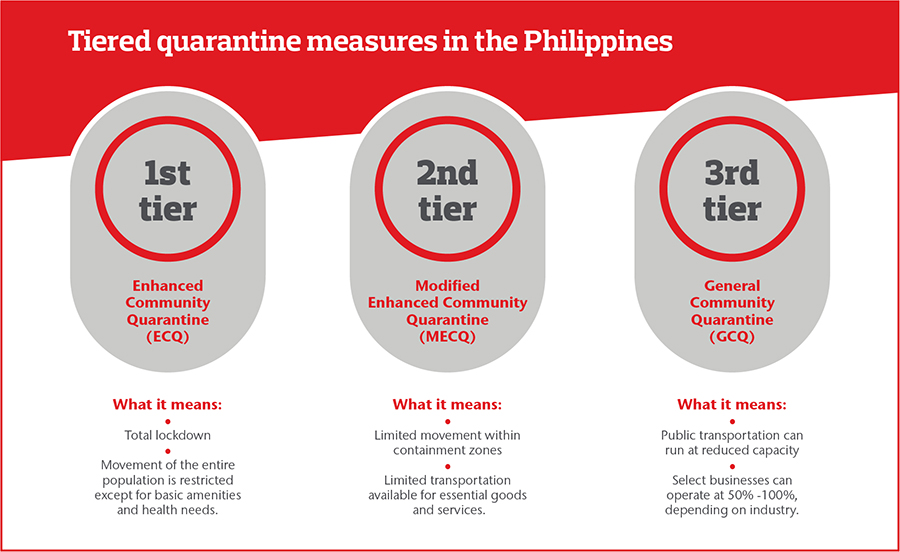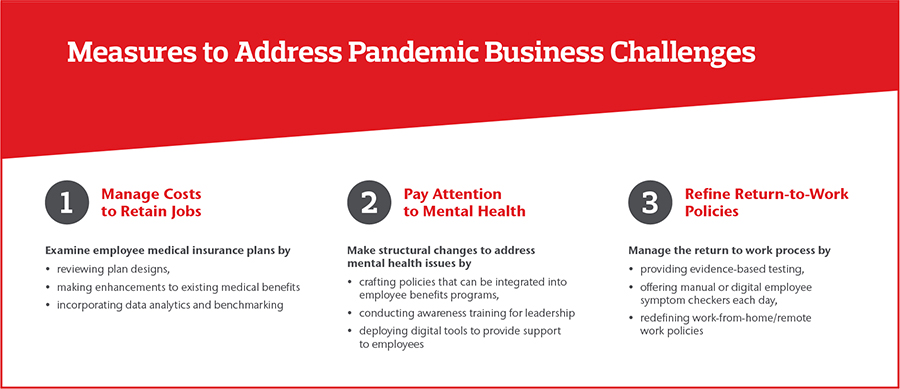3 ways to address the emerging pandemic risk in the Philippines
Building a resilient workforce, People & Organisations
Since April 2020, the Philippines has seen tiered quarantine measures, depending on the severity of infection rates in a specific location – Enhanced Community Quarantine (ECQ), Modified Enhanced Community Quarantine (MECQ), and General Community Quarantine (GCQ).

These tiered quarantine measures have had a range of effects on essential healthcare services and business. As the economy has slowed, businesses have tried to stay afloat by cutting human resources costs, implementing temporary suspension of work and redundancies, sanctioned by the Philippines Department of Labor and Employment.
For their retained employees, organisations are now challenged by a potential rise in healthcare premiums, mainly due to the government’s health plan (PhilHealth) not covering typical inpatient hospital costs for serious COVID-19 patients.
However, these increases are likely to be more than offset. Health insurance benefits have seen significantly lesser utilisation due to the lockdown delaying elective procedures, consumers avoiding hospitals in fear of COVID-19 infection, and hospital staff being reassigned to cope with the pandemic.
Claims data in the Philippines, from March to July 2020, show that aggregate monthly medical claims are 30 to 50 percent of normal levels in corresponding periods. “The COVID-19 pandemic has had an unusual effect on employer health plans in the Philippines – a status quo, or in some cases a decline in the rate of medical claims,” Todd Dore, vice president-actuary of health solutions, Aon Philippines explains.
This unusual dynamic means that the expected loss ratio for the current plan year − and potentially, the next plan year − is well below normal levels. There could well be a decrease in renewal rates for premiums next year, as the current impact of medical claims reductions continues throughout this year and into early 2021.
“This is likely to be good news for the insureds in the upcoming policy years. However, if the Philippines experiences more dramatic spikes in infection rates, there will be an impact on return-to-work policies, making business contingency plans that much more difficult to implement,” warns Dore.
As businesses look to address the impact of the pandemic, the considerable uncertainties surrounding the crisis and its fast-changing nature can easily cloud leaders’ thinking about what is most important. It is critical that organisations focus on areas that have the greatest significance. Among other measures, business leaders can consider the following.

Manage costs to retain jobs
By redefining roles and policies and creating a hybrid workforce with reduced working hours, businesses can adjust their compensation packages, medical benefits, and total rewards. Adjusting existing employee benefits packages to reflect the current situation will also help businesses save costs while retaining their best talent.
Pay attention to mental health
The Philippines has the highest depression rate in Southeast Asia, and mental illness is the third most common form of disability in the country. Dr. Menandro Sandoval, medical director of health solutions, Aon Philippines points out, “The Philippine government has released the Implementing Rules and Regulations (IRR) of the Mental Health Law just a month before the lockdown. This timely measure has kickstarted several compliance initiatives by businesses in the country.”
Employers are examining ways to offer mental health support to the workforce by making structural changes to their organisations to address mental health issues. These include crafting policies that can be integrated into employee benefits programs, conducting awareness training for leadership, and deploying digital tools to provide emotional, social, and financial support to employees.
Refine return-to-work policies
Finally, when employees are permitted to return to work, organisations will need to closely manage the process. Measures such as providing evidence-based testing, offering manual or digital employee symptom checkers each day, and redefining work-from-home/remote work policies will ensure business continuity.
“Employers understand the positive impact of having a healthy and engaged workforce just as much as employees do,” explains Dr. Amitabh Deka, head of wellbeing solutions, South Asia, and Aon Care. “The objective, however, must go beyond just managing the cost of the company medical plan. If you want to retain the basic shape of your organisation with the view to win in a post-COVID-19 landscape, this will be an essential commercial characteristic and not just an altruistic one.”
Looking ahead
“The months of lockdown in all major economies in Asia have led to new habits to form and existing behaviours to evolve. When the Philippines restarts its economy, businesses will need to have the right people to kick-start the recovery process,” says Dr. Sandoval. Retaining the best employees, extending mental health support, and a well-planned return-to-work policy are longer-term investments that will help organisations avoid the aftermath of any knee-jerk responses to the immediate insecurities.
